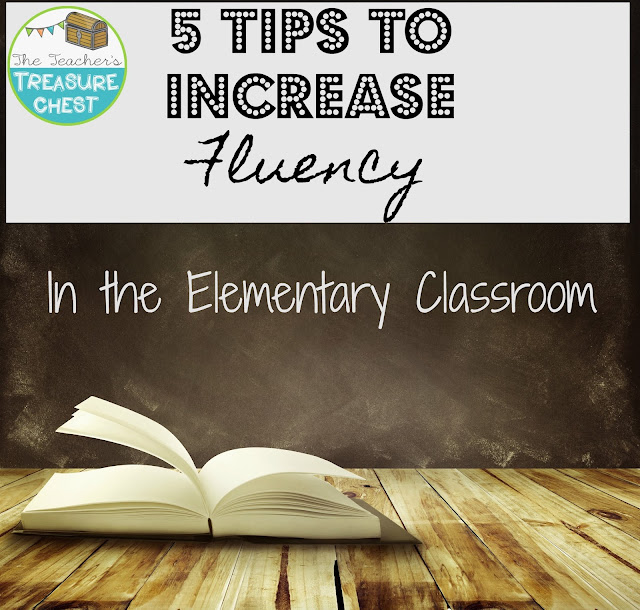How to Increase Reading Fluency
Fluency is such an important but often missed component to solid reading instruction. I'll share a few tips to improve fluency in readers that you can apply today! We know that Fluency is the ability to read a text correctly, quickly, and with expression. Fluency is imperative because it provides a bridge between word recognition and comprehension.We also know that good readers do not have to concentrate on decoding the words, they can think more about on what the text means. Use these five reading fluency activities to increase their independent ability. These reading strategies can be incorporated in ANY elementary classroom.
Fluency Activities for Reading Instruction
How to work on strengthening our students fluency in an engaging way?
Tip One:
Read Aloud To Students Daily to Improve Fluency in Struggling Readers
The number one tip I have is that we should increase they amount we are reading to our students each and every day. By reading aloud, with expression and automaticity, we are modeling for our students what a good reader sounds like. Presenting reading in a way that is fun and meaningful, is a powerful tool. Students need to see reading what reading for pleasure looks like. I like to pick fun and engaging books that fit a natural teaching theme. I just want to be sure the book I pick is intentional to the skill or standard I am trying to teach! I try to read to my students before each subject I teach. I find some way to tie the text together with the content area I am teaching. This way, I am reading aloud to my students at least two to three times a day! I try to read aloud for each subject or content area each day. The more we model for our students what good readers sound like, think and remember, the more our students will gain the necessary skills they need in order to be successful. Through reading aloud, teachers can model how fluent readers read using expression. Be sure to pay close attention to the punctuation so that students can see how punctuation can change the way we read.
Tip Two:
Provide Shared Reading Experiences for Students
Shared reading is a powerful instructional strategy in the balanced literacy framework. In shared reading, EVERYONE has a copy of the same text.
Text can
also be displayed using document camera or each student has an individual copy of the text. The teacher models how the text should sound while reading while students read
a long. This can be a very quick , daily practice that shouldn’t take too long.
I would start with a poem or make a “shared reading notebook”. Students can
glue their poem into the notebook and read along.
http://www.readingrockets.org/strategies/shared_reading
Tip Three:
Use Fluency Activities During Reading Instruction
I Say, You Point
Students gain fluency in this skill because they are looking for
patterns in the word while reading. They hear the word, find it and
point/circle. Fluency activities for this are included in ALL grade levels of my intervention binders.
Tip Four:
Frontload Vocabulary In Reading Lessons
This is a great instructional reading strategy to use during small group instruction. Before reading a text, pick 2-3 words that students may not
know or understand. Teach the words prior to reading the story so that when
students come to the word in the text, they are not struggling with it in
context. You do not want to front load EVERY word they do not know, just a few. This helps students from struggling with understand the words meaning while reading.
Tip Five:
Have Students Try Partner Reading
The
student reads aloud in tandem with an accomplished reader. At a student signal,
the helping reader stops reading, while the student continues on.
BONUS TIP:
Use Listening Center
In elementary school, it is important students are exposed to a variety of texts. Reading fluency will increase if you increase the amount of time that students are being read to. Through a listening center, we are able to address this. The teacher can pick engaging texts that spark student interest. The added component is a great tool to model what a
fluent reader sounds like.
Free Fluency Rubric

Click HERE To get the free fluency rubric
My students really enjoy the fast reads during our small group reading instruction and use them with a partner every week! We've included fast reads in every intervention binder.







This isn't working as a downloadable pdf file for me. I would love to have this!!
ReplyDeletejhoffman143@yahoo.com
Thanks - Julene
Hi, I am so sorry about that. It is fixed now. If you need additional help, e-mail me at benoitcreated@gmail.com and I'll send it over!! Thank you!
Delete